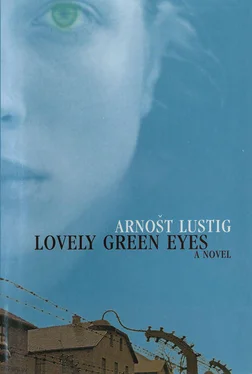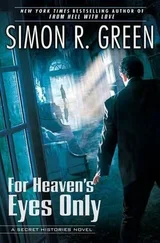Fortunately, she looked innocent. It was more than likely that she was the only girl from No. 232 Ost who had survived.
She toyed with the idea of emigrating to some distant country — to America or to Australia. She’d registered for English classes. Then she added Spanish. After three weeks she gave up. It reminded her too much of her father who, at an advanced age, had joined a rapid-study English class.
We strolled on the wooden bridge over the Vltava River. Trams and cars no longer ran over it, it was now only for pedestrians. It was a pretty bridge and we thought it a pity that it would soon disappear as if it had never existed.
I asked her why she was so gloomy.
“Do I seem gloomy to you?”
“You act as if Adolf Hitler were kissing you.”
“Adolf Hitler is kissing me.”
“Who do you think wrote Hitler’s speeches? Did he write them himself?”
“Your worries!” Skinny exclaimed.
“Don’t you underestimate it,” Adler said. “It’s one — nil for us.”
“Ten — nil,” I corrected him.
“One — nil is enough,” said Skinny.
Did Hanka Kaudersovâ derive no satisfaction from the newsreels shown before each film, showing Hitler in a shabby army tunic, pale and wild-eyed, his head twitching and his left arm dangling helplessly? Wasn’t this a long way from 1941, when he believed that he had won the war and so demobilized 40 divisions and ordered industry to start producing peacetime consumer goods? But was it enough to offset Block 18 of the Frauenkonzentrationslager at Auschwitz-Birkenau or No. 232 Ost?
“Something worrying you?” I asked her, as if I didn’t know.
“No longer. Not with you. Why?”
Her eyes seemed to say that this was no business of mine.
“Your voice sounds as if you were half-buried in snow.”
There was in fact not a single day when she didn’t return to No. 232 Ost or to the ramp at Auschwitz-Birkenau … 4 a.m., a frosty night, stars bright. The young should make themselves older and the old younger.
The duty squad had snatched infants and children from young mothers and flung them on to the cart with the baggage, crutches and rucksacks, but the women screamed for their children. Some of them were saved only because their children got lost in the crush. Others fought their way against the crowd, and half an hour later finished up in the showers.
“Each man is an island,” she said. She had learnt there to do everything quickly. Eat, walk, run. Not to push into the front row. Not to fall behind. From the wooden bridge she was looking at the surface of the river. By the bank, bubbles were rising from the mud. Now and again a fish would splash. A duck was floating with the current.
She was amused when they wouldn’t let her into the Kotva cinema to see Ecstasis because she was not yet 18. Needless to say, we smuggled ourselves in. All that fuss because of one nude scene blurred by shrubs? Rottenführer Schratz had seen quite different parades. A thousand girls for five hours in the rain, heat or snow.
“It’s just like when it rains,” she said. “What can you do? You tell yourself that it won’t rain forever. Or else you find a reason to like the rain.”
The river glistened and murmured. A little way down from us was the weir, where the water splintered and foamed in the dark. On the hill above there were lights in the windows and above the roofs the stars were shining. Below us the water was flowing, under the bridge and onwards. Three old steamers were anchored by the bank. One of them was being converted into a restaurant and another into an hotel. The third would soon be cleaving the waters of the Vltava again.
It came to her like a fly that settles on the outside of your window and, before flying away, reminds you of its presence. Did she envy the water for flowing away into the unknown? Did it arouse in her a desire to share its fate? Or else to throw into it what was not so pleasant?
I watched her, hoping she would not notice. She had a good figure, slim, with an oblong face that remained with me at night when she was not there. Her features, her slim body, her hands and legs aroused in me a longing that was free from desire. Everything I was then yearning for with regard to Skinny was pure — I wanted to take her hand in mine, put my arm round her shoulders, let her put her head on my shoulder or chest — that ineffable feeling from which love springs. She was so pretty, so normal, so healthy.
“The water, just watching it is doing me good.”
“Me too,” I said.
“Isn’t it crazy?” she smiled.
“It suits me.”
From the river came cool air and a faint smell of fish. Suddenly she shivered and a chill ran down her spine before she laughed.
“Getting cold? Want to go?”
“All right.”
That morning she had met a Czech doctor, aged about 35, who had come back from Buchenwald. As a souvenir, he had brought his striped uniform with him. In 1942 he had supplied his Jewish friends with prescriptions for butter, lard and eggs, tapioca and rice when these were no longer available on ration cards. He offered to examine Skinny.
All three of us went to see him. He kept Skinny to the last. Adler was in the best shape, just undernourished. With me, the doctor found traces of calcification following rickets. This could be remedied by wine containing iron. He kept Skinny back. She was worried that he might send her for x-rays. For a while she was reluctant even to undress. He saw the tattoo on her belly, and inevitably asked questions. Would he keep it to himself? She pictured people somewhere poking fun at her expense. It worried her.
Skinny divided people into three categories. The first were those who created the concentration camps and what went with them, and who operated them. These were the Germans and their lackeys. The second group, the largest, were those who did not give a damn, who wanted to live and work, who went along with it, kept their mouths shut and stayed alive, because — and here they were right — one’s life was all anyone had. Finally, the third category, were an infinitesimal minority — those who had the courage to speak up, to stick their necks out.
She had no wish to see again their former concierge who, when he saw any member of her family in 1942, had crossed the street. His wife had her eyes on the furniture, the carpet, the flower-stand or some picture she might secure from their flat before the officials of the Zentralstelle für jüdische Auswanderung got their hands on them. But the Germans made pretty sure that no damned Czech fished their pond dry.
She had gone to look at their old place in Rybnâ Street. Outside the barber’s hung the same ornamental bowl of gilded tin that had been there when they left. Slavomir Slâma, barber and hairdresser, had his flat behind his salon. He welcomed her, one foot in his shop and the other on the pavement, inviting her to step inside. He would trim her fringe. She would look better than Adina Mandlovâ in Girl or Boy . Instead of the No Admittance to Jews or Dogs he now had plaster busts of President Benes and Marshal Stalin in his window. How were her mother and father? And little Ramon? No doubt all four of them were back again? He would be delighted to give them all haircuts. And no doubt little Ramon would by now also need a shave. In honour of the Liberation the whole Kauders family could have one free visit each. He would clean up Skinny’s neck with a new gadget: Swedish scissors. Sweden had supplied more than guns to the Germans. Perhaps she wouldn’t believe this, but after the attempt on Heydrich’s life he had cut the hair of General Horst Böhme, the chief of police. Two S S officers had stood guard outside his salon. He had sweated, he’d rather not say where. He smiled. It’s all behind us now. We all had our cross to bear.
Читать дальше


![Корнелл Вулрич - Eyes That Watch You [= The Case of the Talking Eyes]](/books/32103/kornell-vulrich-eyes-that-watch-you-the-case-of-thumb.webp)









